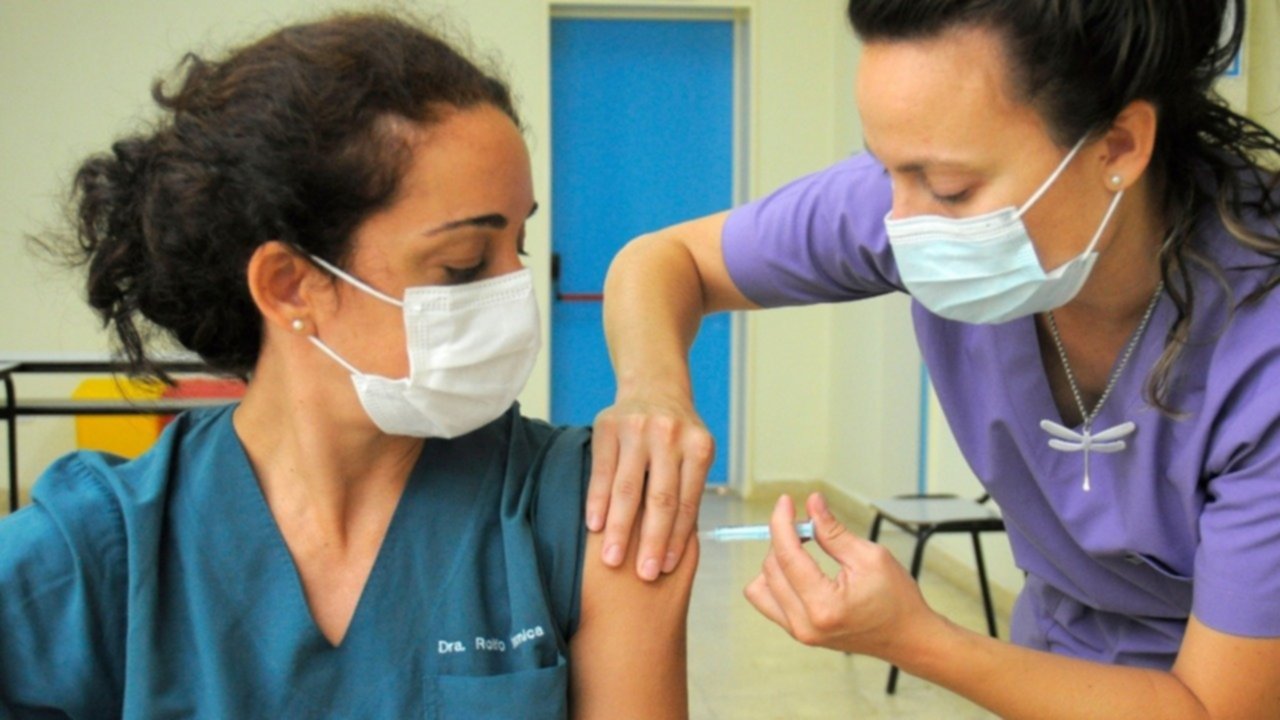
[ad_1]
Sergio Prieta / [email protected]
The coronavirus vaccination campaign does not stop in Bahia and the month of June will mark a new record of vaccinated since the start of vaccination on December 29.
Figures from the Buenos Aires province vaccination monitor indicate that 126,675 requests have been made to Bahía Blanca, of which 104,447 correspond to a first dose, while 22,228 people already have the two necessary to complete the vaccination schedule.
During the first 13 days of June – updated until noon yesterday – a total of 25,029 vaccines were applied, an average of 1,925 per day and in fact last Wednesday a new application record was established with 2,843 first doses in 24 hours.
In addition, and despite being in the middle of the month, the number of applications filed almost reached the highest number provided of all of April, the month in which there were the highest number of vaccinated.
In January, 1,882 first doses were applied at a rate of nearly 61 daily doses, in February 5,272 with an average of 188 and in March another 22,605, or 729 vaccinated per day. In April, the highest number of vaccinations was recorded with 36,277, an average of 1,209 per day and in May, due to the lower arrival of vaccines, there were 33,273, around 1,073.
Of the 25,029 vaccines applied until last Sunday, only 1,524 correspond to second doses and the majority were placed especially during the last weekend. 513 were placed on Saturday and 510 on Sunday.

The lack of second doses, especially Sputnik V, is a cause for complaint from those who applied the first almost three months ago, although health officials have claimed immunity lasts longer and exceeds 90 days. .
AstraZeneca vaccine, its application in Bahia and its effects around the world
Of the nearly 42,000 vaccines that entered Bahia in the past 20 days, some 32,100 correspond to doses of AstraZeneca, a vaccine that some European countries have recommended for use only in those over 55 due to cases thrombosis in children under this age. .
The death of an 18-year-old girl in Italy from cerebral thrombosis has prompted suggestions from specialists who recommend not to apply it to those under 60 and suggest applying the second doses with replacements of Pfizer and Moderna.
In the last few hours, Chile has also replaced the second dose of AstraZeneca for men under 45 and they suggest the second dose of Pfizer. The case of thrombosis in a 31-year-old man led to the suspension of the application of the second doses and the Oxford vaccine is only applied to women over 55 years of age.
Asked about the risks and side effects of this vaccine, Dr Carlos Kholer said that “there is an insistence that the risks of getting serious illness from COVID far outweigh the risks of thrombosis from the vaccine. “.

Although in Bahía Blanca, the health region authorities have assured that they have not had any problems with this vaccine or reports of serious effects among those vaccinated, according to Kholer, foreign statistics do not speak of only one case of risk of thrombosis out of 150 to 250,000 vaccines.
“Women under 40 who are taking contraceptives would be the most affected. However, the risks of using the pill would be much higher than that of the vaccine. It should be borne in mind that the highest statistic was given at the start in the vaccination of the health team, where the female gender predominates and obviously generates a large bias, ”said Kholler.
“This incidence has generated in Europe the decision in several countries to apply it in people over 55 to 60 years old because statistics show that this side effect is not frequent at these ages, probably due to the senescence of immunity and lesser reactivity to the vaccine. “, he counted. He added that the Pfizer vaccine also has a history of thrombosis, although to a much lesser extent.
Finally, he clarified that people who “between 4 and 20 days after the administration of the vaccines show serious symptoms (dyspnea, chest pain, swelling of the legs, persistent abdominal pain, neurological symptoms, such as intense and persistent headaches. or blurred vision, small spots of blood under the skin beyond the injection site), they should see an emergency doctor ”.
“To better understand the characteristics of these infrequent events, active surveillance should be considered, with investigations in sentinel centers or hospitals,” he explained.
“During a large-scale vaccination campaign, it is normal for countries to detect adverse events related to vaccination. This does not necessarily mean that the events were caused by the vaccination itself, but should be investigated to ensure that any potential safety concerns are addressed immediately. Vaccines, like all medicines, can have side effects. The administration of vaccines is based on an analysis of risks and benefits, ”he said.
.
[ad_2]
Source link
 Naaju Breaking News, Live Updates, Latest Headlines, Viral News, Top Stories, Trending Topics, Videos
Naaju Breaking News, Live Updates, Latest Headlines, Viral News, Top Stories, Trending Topics, Videos